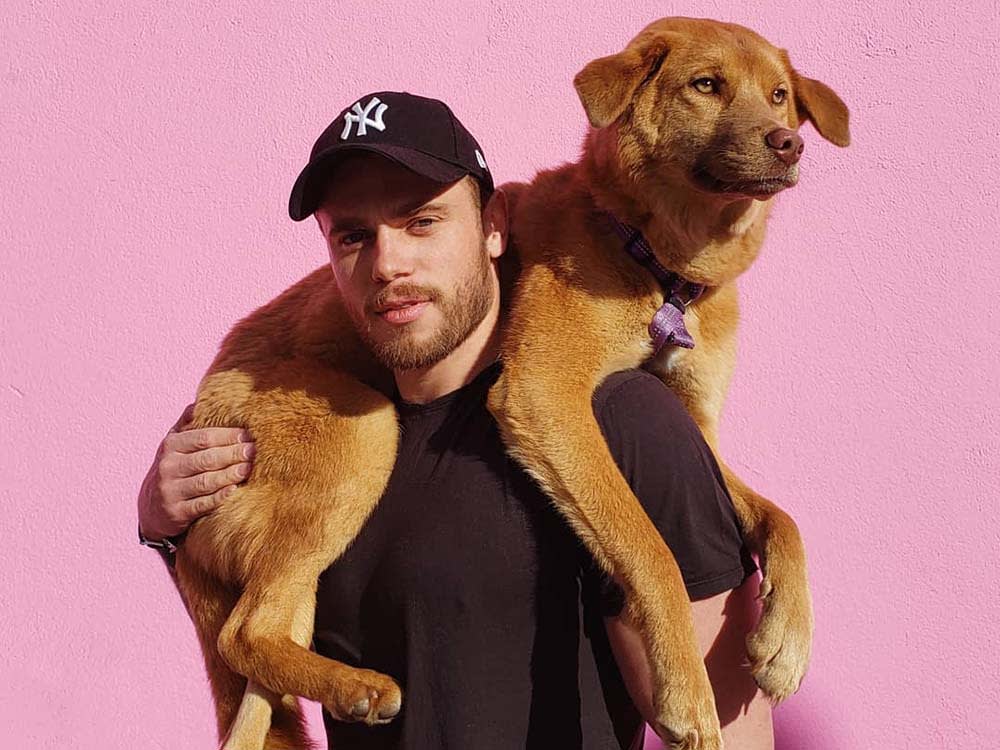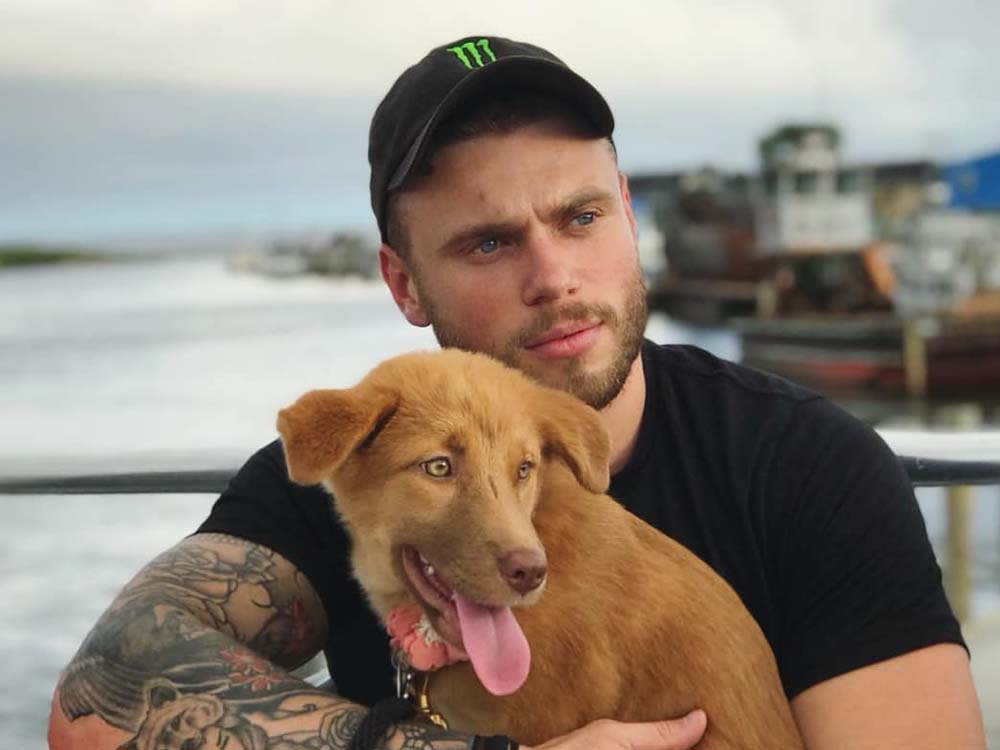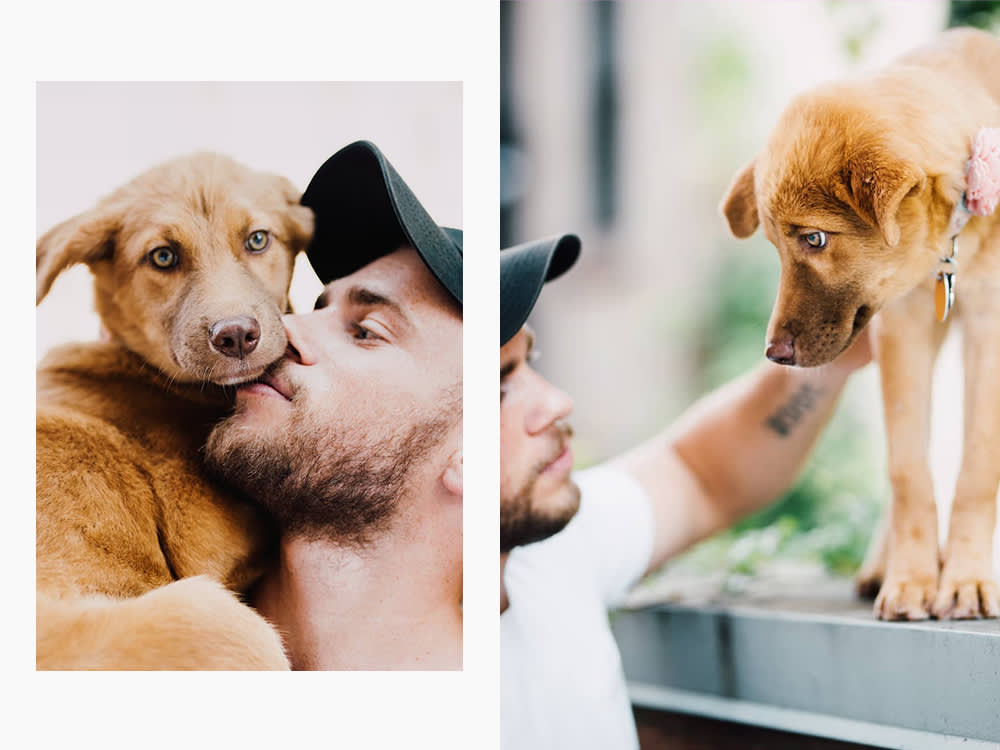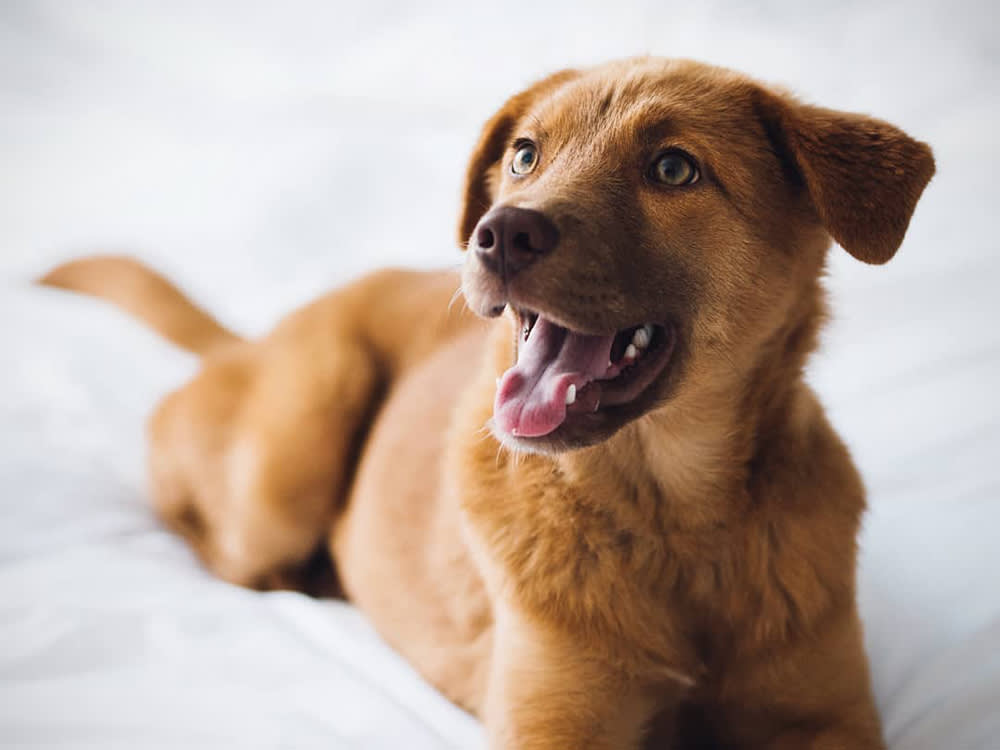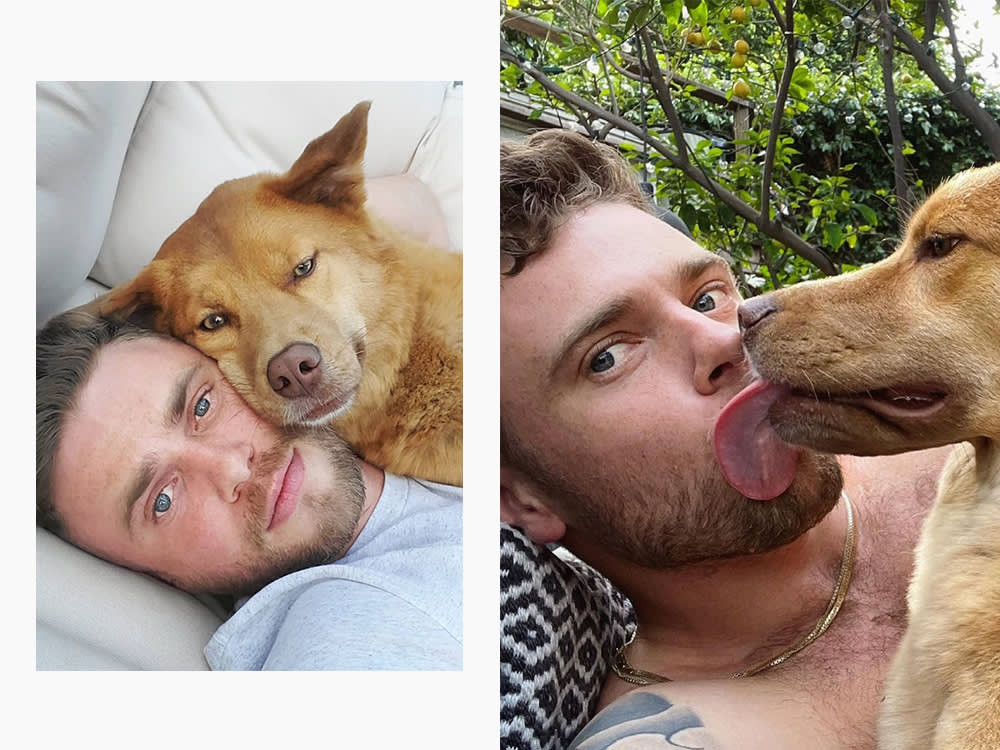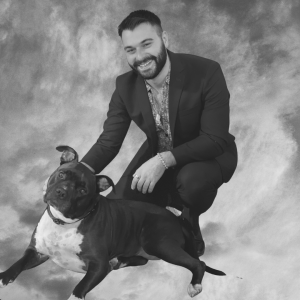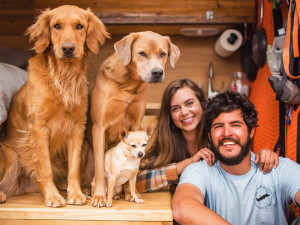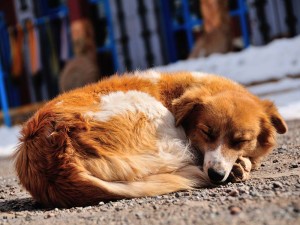Gus Kenworthy & Birdie Are Winning Hearts
The Olympic skier, actor, and advocate on rescuing his dog during the Winter Games and using his voice for good causes.
Gus Kenworthyopens in new tab understands the power of life-altering moments, as the Olympian has encountered no shortage of transformative experiences both professionally and personally. During his debut at the 2014 Winter Olympics in Sochi, Kenworthy won the silver medal in Men’s Ski Slopestyle. The following year, as his notoriety skyrocketed, he came out in an interview with ESPN — an announcement that has been praised as a pivotal moment for the visibility and acceptance of LGBTQ+ athletes.
Then, while competing at the 2018 Olympics in PyeongChang, Kenworthy brought something more valuable than a medal home — his dog, Birdie, rescued from a dog meat farm outside of Seoul. Together, the two have formed a unique bond (and social media presence). Birdie’s Instagramopens in new tab often operates as a cheeky, self-deprecating outlet for Kenworthy to commentate on his own life. Kinship caught up with him to chat about the heartbreaking circumstances Birdie was born into, how she helped him keep his cool during the pandemic, and why he uses his voice to help others.
Was rescuing Birdie from a dog meat farm outside Seoul something you planned prior to competing in the Olympics, or did you discover the issue while there and felt compelled to help?
Heading into the Games, I already had an existing relationship with The Humane Society Internationalopens in new tab (HSI) from work I did with them during the Sochi Olympics four years prior. They asked if I would lend my voice for a PSA about the dog meat trade because it’s obviously just a very sad industry — not just because dogs are being eaten, but also the way that they’re being treated overall. They’re in these horrible farms, in cages that are held above the ground in freezing conditions. If they don’t die while they’re there in captivity, then they suffer excruciating deaths. It’s really awful. So I said of course, I would absolutely lend my voice for a PSA. And while I was over there, I felt like I would be able to better advocate for them if I had actually witnessed one of the farms firsthand.
They arranged for me to visit a farm that they were in the process of shutting down, with 90 dogs that all came back to the US and Canada and were adopted through local agencies in association with HSI. There was actually a dog giving birth in a cage in the corner of the farm that I happened upon while we were there. They basically told me that if we had not been there to film the video, no one would have seen these dogs soon enough and the puppies probably would’ve died due to the negative temperatures. Birdie is one of the puppies that was born that day.
What was the transition like for Birdie, from being born on a dog meat farm to living in a loving home?
You would think that it wouldn’t be as scarring or traumatic because she was so young, but there absolutely was an adjustment period. There were a couple of days in the beginning where I wondered if I had made a mistake. She was afraid of me and would hide under the bed. If I tried to crawl under the bed to get her, she would go out the other side. It almost seemed like a fun game, except that she was actually afraid of me and didn’t want me to pick her up or anything. I was nervous, but then it was a pretty quick transition considering how shy she was initially. And she’s still pretty shy around strangers. If anyone comes over to the house that she’s just not super familiar with, she’s pretty timid. But she’s very sweet with other dogs and people grow on her pretty quickly. But with me it’s different — we’re attached at the hip now. We’re very close. She’s also a pretty independent dog, though.
My boyfriend and I have another dog, Frank, who was his coming into the relationship and he’s much more social. For example, if you move from one room to another, he’ll follow you. He always wants to be in on the action and where the people are. Birdie’s very much a hybrid of the two. She loves cuddling and putting her head on your chest, but she’s also like a cat. Sometimes she’ll just get up and go into a different room, lay down, and be on her own program.
Do you remember the moment when you and Birdie first bonded?
Yeah, I stayed with her for about two days in DC after she flew here — that’s when she was super timid. Then I brought her back to New York where I was living at the time. Poor thing’s actually traveled quite a lot because I live in Los Angeles now. But it was in the first day or so in New York that I think she realized this was a good thing. She had her own bed, a whole bunch of toys and blankets — basically everything waiting for her. She then pretty quickly became the queen of the house.
Speaking of traveling, in addition to competitive skiing, you also do a bit of acting and reality TV — all of which I assume involves a fair amount of travel. Does she go on the road with you, and if so, does she have any separation anxiety?
I don’t know if she has any separation anxiety. She’s pretty good at being independent and on her own for a little while. But when my boyfriend or I come home, she absolutely freaks out. As we walk through the door, both of our dogs will be, like, squeaking and spinning around to the point where we’re like, Calm down, we just went to the post office! She’s good with traveling, but when I’m on the road training or competing, my partner will stay here in LA with the dogs, so it’s really no issue.
Birdie’s voice on Instagram is pretty sassyopens in new tab. How does this reflect her personality IRL?
It couldn’t be more opposite, but I love it. I feel like her voice on Instagram is sometimes more like my inner voice — basically a hybrid of if she was a housewife on Real Housewives and Stewie Griffin from Family Guy. I just thought that was fun when I was making it. I mean, it’s so corny to have a dog on Instagram. I realize that with full transparency, but I also don’t care and I love it. I think it’s cute and I like when other people do it too, even though it’s kind of dorky.
Beyond her shyness and cuddliness, what aspects of her personality are not displayed on social media?
How actually sweet she is. Her Instagram depicts her as a diva, but it just couldn’t be further from the truth. She’s just a really sweet dog. She’s also really uncoordinated, which is very funny. Our other dog is a little Terrier mix and he’s always, like, climbing up on trees and walking across railings — he’s super agile. But Birdie falls down stairs! She doesn’t realize how long her legs are so she often trips over them. She’s really clumsy. It’s really cute.
So given her clumsiness, I’m assuming she doesn’t train with you?
I feel like this is me having separation anxiety, but at the beginning I’d bring her to the gym when I was living in Colorado. I was going to a small fitness studio and they were fine with me bringing her in, so she would just wander around for a minute or two, then come curl up and watch my workout. I was sort of doing that in LA too. But we work out together. She loves going on hikes; both the dogs do and I like doing that for them. They sleep so much better and they’re so much happier. When I’m home, I try to take them on a hike almost every day.
Getting outside is something I think a lot of us may have taken for granted prior to the pandemic. You have spoken openly about your mental health struggles during this time. Has Birdie had a positive impact on your mental health?
She’s absolutely had a positive effect on my mental health. She’s a constant in my life. During the pandemic, when things were a bit bleaker and there wasn’t much to do, she really was the reason I got out of bed. She was my reason for getting up and going outside. I feel like had it not been for her, I might have been even more holed up than I already was, and I was struggling with that. So she was my motivation. She got me exercising and getting fresh air, and just provided a whole lot of comfort and company.
I also read that you picked up guitar during the lockdown. Some dogs are sensitive to noise, while others find music calming. Do you ever play for Birdie?
I do try and play for her and our other dog, Frank. She doesn’t love it. She’ll tolerate the quieter stuff — if I’m playing softly, like a finger-picking song — but if I’m strumming and singing and it’s louder, she leaves the room...which I do take personally.
You are one of the first professional athletes to come out publicly, a move that has since led to increased acceptance and awareness in the sports world. You’ve also spoken out in support of Black Lives Matter and animal welfare. How important is it to you to use your platform to bring awareness to worthy causes?
I think it’s super important. It’s about recognizing privilege and recognizing the fact that while you aren’t necessarily affected by certain issues, that doesn’t mean other people aren’t. I think it’s important to speak up for and help amplify the voices of anyone who’s been more marginalized or disenfranchised than you. Everyone has a voice and everyone has a platform, but when you have an elevated platform, you have even more responsibility to do something and say something because your voice is amplified.
